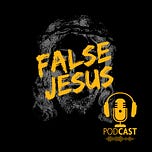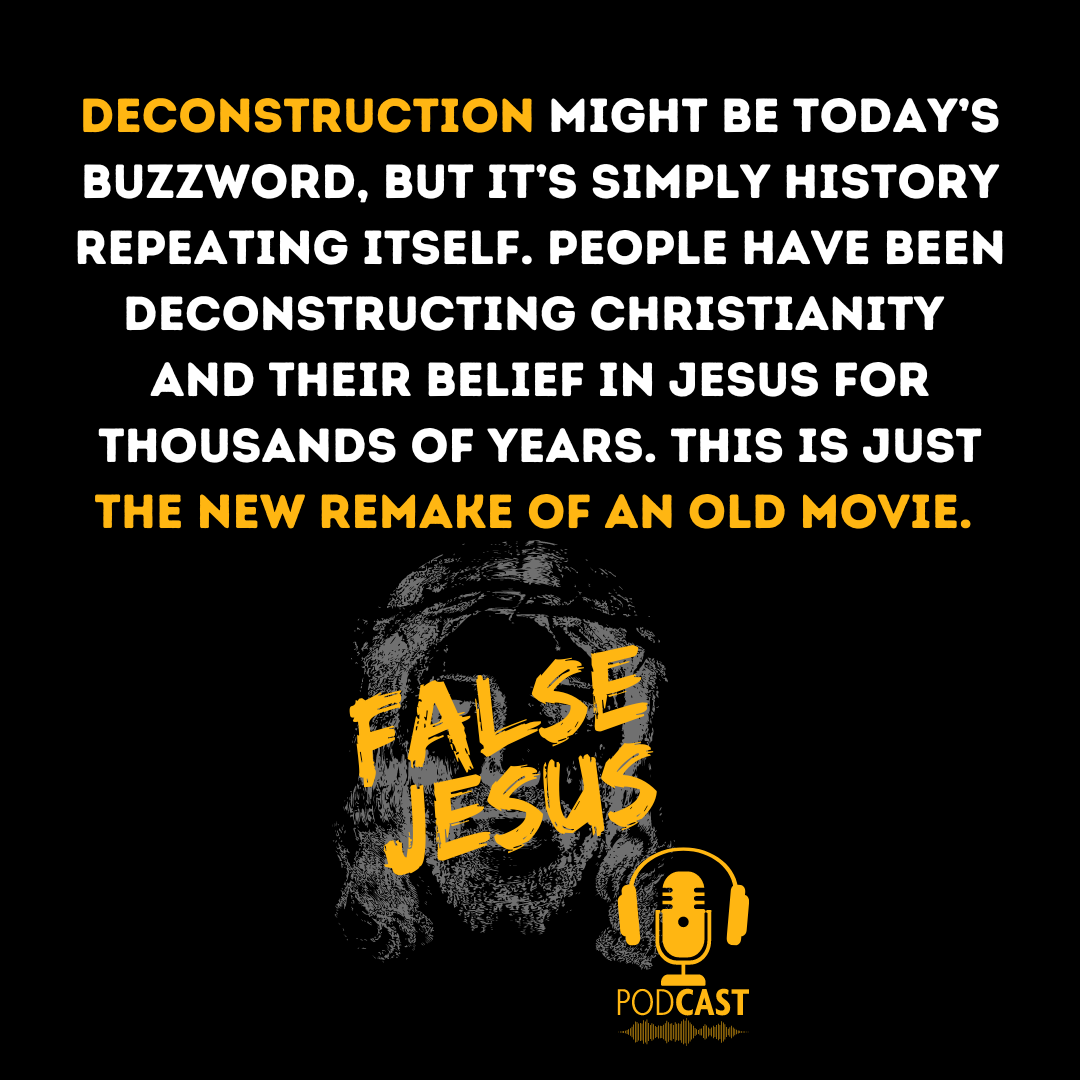Taken at face value, the word “deconstruction” is a literary analysis of a text and its meaning. A breaking down to get to the significance of something written or spoken.
However, deconstruction has become a loaded term today.
Deconstruction is now the popular spiritual buzzword within today’s mainstream Christian culture. This word might be newer to some with the rise of social media as we’re hearing more often about Christian celebrities deconstructing and leaving their faith or the forecasting of an entire generation deconstructing their faith and leaving the Church. However, it has been around for a while in America, and its sentiment has been around for thousands of years reaching across the globe.
While the word “deconstruction” is newer in the 2000s, the process of questioning faith in Jesus and the beliefs of Christianity is as old as the movement itself. In fact, a “doubter” named Thomas was a part of Jesus’ original ministry team, and he demanded solid physical evidence before he would believe in Jesus’ resurrection (see John 20:24-31). You can read about people who were following Jesus, but then after hearing Him preach a hard sermon they didn’t agree with, they left Him. They stopped following Jesus (see John 6:25-66). Even Jesus’ own family struggled to believe in the validity of Jesus’ claims having grown up with him (see John 7:1-5).
The practice of questioning Christianity and disagreeing with Jesus and His teachings is all over the pages of the New Testament of the Bible.
Deconstruction might be today’s buzzword, but it’s simply history repeating itself. People have been deconstructing Christianity and their belief in Jesus for thousands of years. This is just the new remake of an old movie.
So, it’s with fear and trembling before God that I want to put a new spin on both the old movie and the new buzzword.
Deconstructing the False Jesus
Have you ever considered that Jesus would welcome the deconstruction of today’s mainstream version of himself and cultural Christianity? Re-read that question slowly.
I think Jesus would encourage deconstruction.
To be frank, that’s what I’ve been doing over this last year as we’ve journeyed together.
This little passion project called ‘False Jesus’ exists to examine the cultural misconceptions about Jesus and Christianity. Both inside the Church and for those who don’t follow Jesus. My hope with this podcast is to re-present the Jesus of the Bible to those who are willing to listen.
On this journey, we’ve discovered together that some of the things we learned about Jesus as kids were simply not true. We’ve also learned some things that maybe we were never taught growing up, and we wouldn’t have known these truths unless we did a deep dive into what Jesus said about himself. As a result of examining the Scriptures for ourselves (and not just taking someone else’s word for it), we have been surprised (in some instances) that our childhood or college version of Jesus and Christianity does not equal the real Jesus and His original teachings. The Jesus we see in the mainstream media and political rallies is a False Jesus.
Welcome to my ongoing process of deconstruction. If that’s what you want to call it.
We have been asking hard questions and wrestling with culture’s misrepresentation of Jesus. We’ve been examining Jesus’ claims about Himself. We’ve been looking at the difference between the movement of Christianity when compared to world religions. We’ve asked age-old questions including Jesus’ legitimacy.
But now let me take it one step further…
I think an argument could be made that Jesus led the first deconstruction movement. With his very life and groundbreaking teaching in the “Sermon on the Mount” (Matthew 5-7), Jesus broke down thousands of years of Jewish and religious tradition and preached a new Way. As Jesus dismantled certain man-made religious laws, rabbinical teachings, and wayward motives, He also claimed to fulfill God’s initiated law and long-standing prophecies. Jesus’ life, teachings, and ministry turned an entire religious system on its head in just a few short years.
How’s that for deconstruction?
God-Initiated vs Man-Made
Now, this is where I have to be very careful to be absolutely clear, lest you think I’m a heretic. We have to focus on those two terms in deconstruction.
God-initiated versus man-made.
Huge distinction. Massive implications.
In the Sermon on the Mount, Jesus draws a clear difference between what is God-initiated and Man-made. In essence, Jesus keeps what God initiated with his people in the first place and throws out the extra rules and behaviors that were made and modeled by man. He highlights a God-law and explains the heart behind it but throws out the Man-law and exposes the motive behind it.
Mattew 5 records Jesus saying several times, “You have heard that it was said…but I say…” You’ve heard it taught…and then He goes on to quote the Law that God downloaded to Moses. He doesn’t disagree with it, but He then expounds on it with meaning. Jesus “ups the ante” on the heart behind the law.
For example, the heart behind “You must not murder.” is that you and I should not kill people, yes. But Jesus went deeper and said we shouldn’t even have hate in our hearts for anyone. We should have God’s desire for reconciliation of relationships (Matthew 5:21-24). That’s at the heart of God’s Law.
Another example is the heart behind “You must not commit adultery.” as the healthy pursuit of purity and love, not the corroding cycle of lust and its consequences (Matthew 5:27-30). Jesus reveals God’s care for us when He expounds on that law.
Jesus not only dissects the Law with the heart behind it, but He then goes on to call out the behavior of the religious individuals who are completely missing the point and the heart of God by heaping all of these extra and unnecessary expectations on people.
Does this not sound familiar? Is this not what most people are deconstructing Christianity for today and centuries past?
In my conversations with people who are deconstructing their Christian faith, most of them are not leaving because of Jesus. They’re leaving because His followers are missing the point. They’re leaving because of bad church experiences. They’re leaving because churches teach more about political positions than passages of Scripture. They’re leaving because of pastoral abuses. They’re sick and tired of the traditions and church in-fighting that is more prevalent than the heart of God.
Jesus was the master deconstructor of religious and institutional hypocrisy and man-made preferences and traditions. Jesus tore down that type of behavior of man-made religious systems and showed people the Way of God. The Way of Love.
I believe that Jesus deconstructed what was man-made and fulfilled what was God-initiated. Jesus tore down the cultural and acceptable religious interpretations of those laws and built back the original meaning of God’s Law through His teachings and His life. He dismantled the years of religious baggage and presented God’s covenantal desire for a relationship with Him and with each other.
Did Jesus Encourage Deconstruction?
What I love about Jesus’ model of relational discipleship is that He welcomed good questions and tough conversations from His students. He asked hard and thought-provoking questions in His teachings, and He encouraged people to wrestle with their doubts. A good exercise might be to read the Gospels and highlight every time a person asked Jesus a tough question and when Jesus asked a difficult question in return.
The point is this…Jesus is not afraid of our hard questions. Jesus is not anxious over our doubts. Jesus is not nervous about people deconstructing or even leaving the Christian faith. Before you think I’m crazy, let me show you…
John 6:21-59 records a fascinating and hard-to-understand sermon from Jesus. In it, He calls out people for simply following Him for the “show.” Signs and wonders…and more food. Jesus had just miraculously fed the 5,000 the day before and now the people wanted more. Well, Jesus gave them a lot more than they came for.
Jesus taught them a hard-to-swallow sermon about Him being the Messiah and the Bread of Life. He taught that people would have to eat His body and drink His blood, which was a foreshadowing metaphor that many of them apparently took literally. They came to the conclusion that Jesus was some sort of cannibal cult leader. This put them over the edge.
Take a look at verses 60-67 and focus on the questions between Jesus and his disciples.
Many of his disciples said, “This is very hard to understand. How can anyone accept it?” Jesus was aware that his disciples were complaining, so he said to them, “Does this offend you? Then what will you think if you see the Son of Man ascend to heaven again? The Spirit alone gives eternal life. Human effort accomplishes nothing. And the very words I have spoken to you are spirit and life. But some of you do not believe me.” (For Jesus knew from the beginning which ones didn’t believe, and he knew who would betray him.) Then he said, “That is why I said that people can’t come to me unless the Father gives them to me.” At this point many of his disciples turned away and deserted him. Then Jesus turned to the Twelve and asked, “Are you also going to leave?”
I want to stop there so we can see that many of Jesus’ disciples chose to leave Him. After hearing that sermon, they questioned Jesus. They doubted His claims. They could not accept that Jesus was the Messiah, and they would no longer follow His teachings. They deconstructed their faith and trust in Him, and they chose to leave the movement.
That is heartbreaking. It’s tough to read this let alone experience it firsthand. It’s devastating to see people who’ve grown up in the church deconstruct their faith experience and then leave. It’s rough to watch people go through this process of dismantling the hard teachings of Jesus and choose to leave the church. But I really want us to notice something here.
Did you see how Jesus responded? It’s even more fascinating than the sermon itself.
Jesus turned to the twelve apostles whom He had chosen and asked them a question. A massive question. A shocking question. A deconstructing question.
“Are you also going to leave?”
Hold up. That’s crazy! Did Jesus really give his closest followers permission to leave? Did He give them an out? After following Him and seeing the miracles and hearing Him teach, did Jesus really just ask that question? “Are you also going to leave?”
Yes! Yes, He did.
This was a massive watershed moment where Jesus encouraged them to take all that they’ve seen and heard from Him and to weigh it very carefully. He gave them a choice. Stay or go. This is where the rubber meets the road, fellas. It’s put up or shut up time. Are you in or out? Think hard before you make the leap!
Jesus encouraged even his closest followers to critically think about Who they were following, what they believed, and what they were getting themselves into. I believe that Jesus, at that moment, instigated his own student’s consideration with this incredibly hard question of what we now call deconstruction.
Two Responses to Deconstruction
I don’t know if Peter’s answer was instantaneous or if he took some time to consider it before speaking. Was it a gut reaction, or was it carefully weighed?
In response to Jesus’ question, Peter asked a question and immediately answered it. He replied, “Lord, to whom would we go? You have the words that give eternal life. We believe, and we know you are the Holy One of God.” (John 6:68-69)
This is a very different response than the first group who decided to walk away from Jesus. Peter, on behalf of the twelve, said we believe. We’re in. We’re going to continue following you, Jesus.
Here we have two radically different deconstruction responses to Jesus’ teaching and questions. We see both groups are given the same opportunity to carefully consider following Jesus. Both groups were encouraged to really think before they made their decision. Both groups had the choice to walk away from Jesus.
One group does. The other does not.
All I simply want us to see is that Jesus made room for what we now call deconstruction. He wants people to examine His life and His teachings carefully. His model of discipleship and sermons were full of great questions. Jesus encouraged people to bring their questions to Him, and He addressed their doubts. This is what I love about Jesus!
But it makes me wonder if our model of discipleship in our churches today allows for the same kind of questioning and wrestling. Do we give people a forum to ask hard questions about Jesus and Christianity? Do we allow people to bring their doubts out into the open for a good conversation? When people do feel comfortable enough to ask and doubt, are they met with love and grace or ridicule and disdain?
If Jesus gave his disciples the opportunity for deconstruction, our churches should make it safe for people to do so with us. The Apostle Paul encouraged the Church in 1 Thessalonians 5:21 to “test everything that is said. Hold on to what is good.”
I wonder what would happen in our churches if Christians created a safe space for this kind of testing. I wonder what would take place if we gave people an opportunity to ask the really hard questions about Jesus and Christianity within a civil dialogue. I’m curious about a model where skeptics would be encouraged to deconstruct openly while being challenged to study the real Jesus in the pages of the Bible and not just take someone else’s word for it.
The reality is they still might walk away from Jesus and His teachings, but at least it wouldn’t be because of the harmful behavior of the people in His Church.
Before You Go
This ‘False Jesus’ podcast is all about fixing our eyes on the real Jesus of the Bible. Terms like “deconstruction” can be so divisive in our culture when not explained or fully understood. My simple desire is to unify us on Jesus and what He taught. My hope by bringing this perspective is to encourage you to keep asking questions about God, Christianity, Jesus, and the Bible.
If after hearing this you don’t agree with me, that’s okay. My stake in the ground has been and will continue to be…Don’t take my word for it. Take God’s Word for it. Follow Jesus, not me. Consider Jesus’ teachings, not mine. Test everything I say according to the Bible and follow the lead of Jesus.
If genuinely testing and asking good questions means we’re deconstructing, then I think Jesus would encourage it.
Bring your concerns to Jesus. Ask Him to show you the answers. Read what He has already revealed in the Bible and ask the tough questions. Don’t ever stop bringing your doubts. The real Jesus is not afraid of your deconstruction.
With every False Jesus podcast, I like to include a creative piece. This one is an excerpt of a song written by Grammy-winning rapper, Lecrea, on his “Church Clothes 4” album.
Deconstruction
by Lecrae
Tears streaming as I weep, felt I heard the Lord speak I've been running from you but you never ran away from me It was people that hurt me, it wasn't God, though I let the church trauma turn into a God wound I learned the western world has twisted up the scriptures So when I re-enlisted, I learned the eastern context The way that Jesus meant it My peace has been cemented, my soul has been re-lifted My deconstruction ended, reconstruction is beginning My peace has been cemented, my soul has been re-lifted My deconstruction ended, reconstruction is beginning Find your way back home
Click here to listen to the full song with lyrics.
With every False Jesus podcast, I like to suggest an organization or ministry you may want to consider. If you are a person of faith and a sports fan or know someone who is, then you have to check out Sports Spectrum, where sports and faith connect.
Led by my friend, Jason Romano, who was an Emmy-Award-winning Producer and Senior Manager at ESPN, Sports Spectrum is an incredible ministry full of podcasts, magazines, devotionals, and videos for athletes and fans of all ages.
When you visit sportsspectrum.com, you’ll hear podcasts of player and coach testimonies, you’ll read thousands of God-first articles from professional athletes, and you’ll see amazing videos about the intersection of sports and faith that you can share with your friends.
I highly encourage you to check out Sports Spectrum and all of its content today!
















Share this post